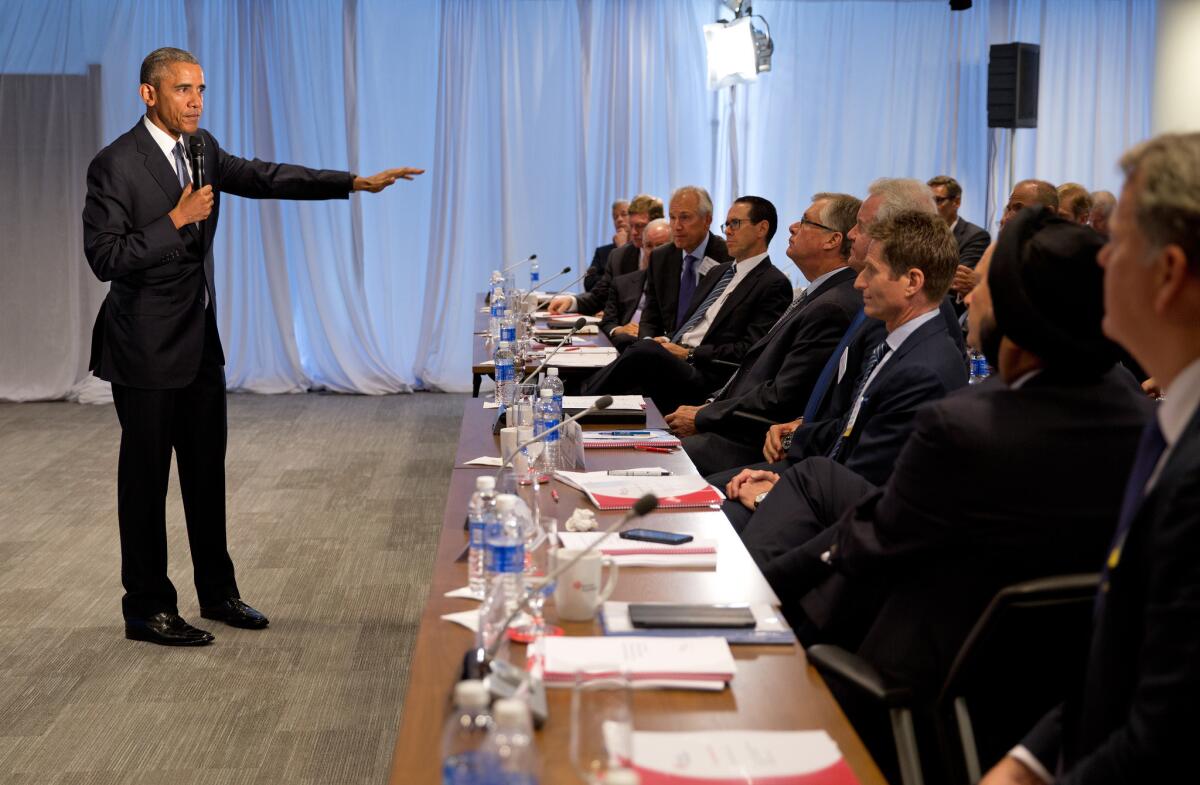The Obama administration really is worried about the U.S. economy

President Obama addresses the quarterly meeting of the Business Roundtable on Sept. 16 about the current state of the economy.
- Share via
The natural instinct of the people making economic policy at any given time is to put the best gloss on fresh economic data; that’s why the White House described Friday’s fairly dismal job numbers for September as marking “the 67th straight month of private sector job growth, extending the longest streak on record.”
But that doesn’t mean their eyes aren’t on the ball. White House chief economist Jason Furman, in fact, delivered an unmistakably candid and fretful assessment of America’s economic future on Wednesday, warning that growth is threatened by what has become a long-term decline in the pace of business investment despite robust profits.
What’s at stake, he says, is the continued growth of productivity. Without a pickup in investment, the risk is “stagnation.”
The financial crisis shocked the level of investment, and advanced economies have yet to catch up.
— White House chief economist Jason Furman
And where are the high profits going? To dividends and share buybacks. In other words, companies are enriching their owners today by mortgaging their--and our--future.
Furman, the chairman of the White House Council of Economic Advisors, certainly isn’t the first person to sound the alarm. Just last year, economist William Lazonick of the University of Massachusetts bemoaned in the Harvard Business Review how share buybacks were producing “profits without prosperity.”
But it’s remarkable to hear the same concern emanating from the White House. So let’s examine the theme of Furman’s remarks, delivered at the Progressive Policy Institute in Washington.
As a foundation, he points out that business investment across the developed economies has not come close to making up its shortfall from historical averages since the 2008 financial crisis. (See the chart below, from his published paper.) In the category of equipment investment, the gap has widened.
“The financial crisis shocked the level of investment,” he says, “and advanced economies have yet to catch up.” He’s talking about a multi-year trend, by the way. The falloff of investment this year is fully accounted for by the halving of oil prices over the last 12 months, which cratered drilling investments.
Furman also dismisses the business lobby’s claim that “uncertainty” and pessimism about government policy (they mostly mean the threat of higher taxes), is suppressing investment. On the contrary, he observes, CEOs’ business outlook has been improving, and “has generally averaged around pre-crisis levels.”
The real change in corporate cash deployment has been in the flow toward shareholders via dividends and buybacks. “Nonfinancial corporations are now returning nearly half of the funds that could be used for investment to stockholders,” he reports. “The current share of funds being returned to stockholders...has been trending higher for decades and remains at a high point compared with historical averages.” (See chart below.)
One implication of all this is that the government may have to step in and take up the investment slack. Furman’s prescription is nuanced. “Public R&D [research and development] investment is at a historic low as a share of the economy,” he observes. “Since public R&D tends to focus on the ‘R’ and private on the ‘D,’ it is important for long-term productivity growth that both components remain robust. (This is a plea for Congress to end the budget sequester and enact President Obama’s program for infrastructure investment.)
Furman does acknowledge that technological changes may make the corporate investment numbers look worse than they are. For one thing, economists may be looking for investment in the wrong place, because the most potentially productive new ventures may be those requiring less capital than traditional businesses.
“Although Snapchat and WhatsApp require relatively little capital, consumers access them through the often large investments in wired and wireless networks made by Internet service providers,” he conceded.
His figures show that investments in intellectual property have been on the rise as those in equipment have fallen--if the former don’t require as much capital as the latter, then the gross statistics may overstate the effect of the decline in overall investment.
The emerging pushback against Furman’s theme, such as this analysis by Tim Worstall in Forbes, makes this point.
But it would be foolhardy to dismiss Furman’s basic argument. Business investment hasn’t recovered from the Great Recession, and too much of the money flowing in to corporate coffers has been flowing out to shareholders, instead of to making companies’ businesses stronger for the future. The economy really does hang in the balance.
Keep up to date with the Economy Hub. Follow @hiltzikm on Twitter, see our Facebook page, or email michael.hiltzik@latimes.com.
More to Read
Inside the business of entertainment
The Wide Shot brings you news, analysis and insights on everything from streaming wars to production — and what it all means for the future.
You may occasionally receive promotional content from the Los Angeles Times.










